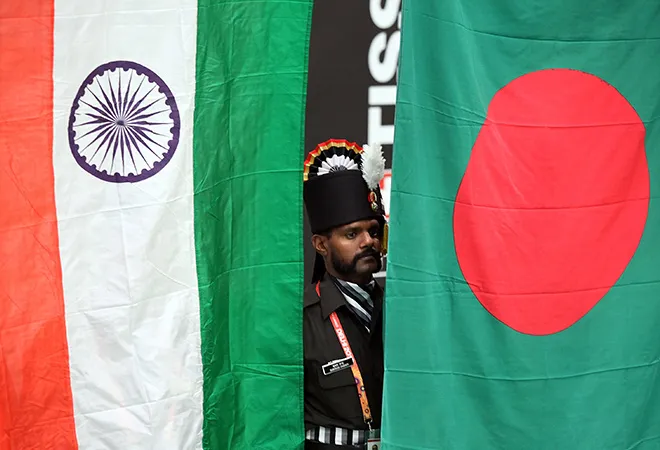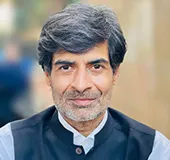
Dhaka Tribune< style="color: #333333">: How do you describe the current relationship between Bangladesh and India? Do you find any irritants in the relationship? If so, what are those and how could those be overcome?
Samir Saran< style="color: #333333">: Both India and Bangladesh have in recent years strived to overcome many of the legacy issues in their relationship. Today, we have an opportunity to strengthen our< style="color: #333333"> engagement even further. This requires the polity and people of the two countries to achieve closure on some irritants that continue to fester, especially the Teesta water sharing arrangement. New Delhi will need to make an extra effort to resolve India’s internal contradictions and move ahead with the agreement that is a real and an emotive issue for the people of Bangladesh. A fresh approach to bilateral trade relations is also needed. Bangladesh businesses and society need to see tangible gains from India’s rise and trade terms need to be more favorable to ensure equity on this front.
DT: You said on Wednesday (March 13) that the relationship between Dhaka and Delhi is at its best. Do you think that there are areas where both countries can work to further the relationship?
SS: I had remarked that the government to government relationship between the two countries were strong and robust and had achieved a new high in the recent past. I had also mentioned that for a truly sustainable and strong relationship, it is necessary to invest in creating new constituencies that can take the relationship forward. We have to ensure that our businesses, media and research institutions collaborate with greater intensity and conviction and provide a new impetus to this very important bilateral. The two countries must also support purposeful conversations on trade and infrastructure connectivity in the region, within and outside regional institutions such as the Indian Ocean Rim Association and the BIMSTEC. The common determination of the two countries to achieve the Sustainable Development Goals (SDGs) offers a possibility for them to collaborate in this journey. Our homegrown solutions can be shared with each other and also with the larger developing world. Technology sector, smart cities, rural transformations and the blue economy potential of the region, all offer new opportunities for partnership.
DT: Many people in Bangladesh tend to believe that India tries to dominate over Bangladesh and makes effort to intervene into the internal affairs of the country. Are they right? Do you think the relationship is based on mutual respect and interest?
SS: India has and always will respect equality in international relations and respect for sovereignty. It does not interfere in the internal affairs of others and has always adhered to international law and norms of state behaviour in its relationship with other countries. This is true of Bangladesh as well. When India lost a maritime dispute to Bangladesh in 2014, under a dispute resolution proceeding, it respected that verdict in contrast to some other countries in the region which have rejected such processes when they have gone against them. The relationship is certainly built on trust and mutual respect as can be seen in the process followed to resolve the border issue as well. All nations make choices based on their self-interest and this is true for India and Bangladesh as well.
DT: Do you agree with those people who suggest that if the Teesta water sharing agreement is signed, border killing is brought to zero and the trade imbalance that is heavily in favour of India are addressed, Bangladesh-India ties will be further strengthened?
SS: Without responding to the subjective allegations, let me first put on record that the India-Bangladesh ties are indeed strong. This is not to say that issues do not remain. The solutions are more often hindered because of domestic politics in India and Bangladesh, and less so for the lack of political will at the level of the leadership of the two countries. I am sure that we will see a new momentum in Delhi to address all outstanding issues after the general elections in May. I have always favoured soft borders, they should be a location that enhances commerce and value creation. Hard boundaries are a tragic consequence of old mindsets. Trade issues and Teesta water sharing arrangement must be addressed at the earliest to the satisfaction of all.
DT: What are the areas both the neighbours should work on in the coming days for the benefits of their peoples?
SS: Both India and Bangladesh seek development and economic growth for their large and young populations. We must do this at a time when new technologies are changing the way we work and live, and we must do this in a carbon constrained world. These are new challenges for both of us. With similar demographics and development outlooks, these should be the key area of cooperation going forward. On the regional front, India and Bangladesh should also now start imagining a political and economic order for the Indo-Pacific. Both countries have an interest in sustaining a rules based order in the region, both have increasing stakes in a favourable and stable external environment.
DT: There is a perception in Bangladesh that the Indian government favours Awami League. Should it be the case? Should Delhi not work with the government of the day?
SS: India and Indians respect the democratic choices of the people of Bangladesh. While Delhi will maintain good relations with all political parties, it will naturally work with the government in charge of the country. Having said this, it is time that we engage with Bangladesh and its citizens and institutions more robustly. Diplomacy today is also about engaging with individual and communities effectively.
This interview originally appeared in Dhaka Tribune.
The views expressed above belong to the author(s). ORF research and analyses now available on Telegram! Click here to access our curated content — blogs, longforms and interviews.




 PREV
PREV


